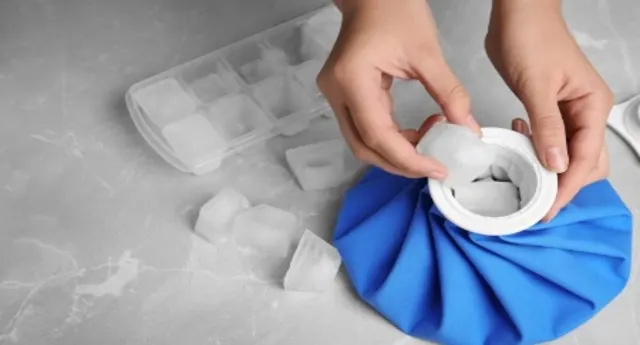Swollen vagina: Why does it happen and how to soothe?

Having a swollen vagina is more common than one would have imagined and can cause pain and discomfort. However, in most cases, it isn’t something to worry about. There are many reasons why you could have vaginal swelling - periods, pregnancy, and rough intercourse can all lead to swelling in the vaginal area or swollen vulva.
What is vaginal swelling?
Vaginal or vulvar swelling is when you notice redness and inflammation on the labia and other parts of the vulva, the exterior portion of your genitals. You may also experience vaginal swelling due to certain disorders, infections or conditions. In such situations, it is important to detect the reasons and introduce measure to treat it.
Other Symptoms
If you have any type of infection, you may experience other symptoms along with swollen vagina. These symptoms could also indicate another underlying medical problem. Some of these symptoms are:
- a feeling of hotness around the genital area
- bump on the labia
- burning sensation
- itching
- pain
- redness
- strong or foul odour from the vagina
- unusual or excessive vaginal discharge
Excessive vaginal discharge can be extremely uncomfortable and managing vaginal discharge is one of the many uses of panty liners. The ALWAYS Multiform Panty liners help you stay fresh and comfortable all day. They are designed for high flexibility, so you can feel confident and go about your daily routine. Their 1mm thinness and breathable design ensures that you feel dry and great, at all times.
Causes of vaginal swelling

Here are some of common causes of a swollen vagina.
1. Skin irritants -
Certain chemicals in everyday products indirectly or directly affect the vagina. These products include laundry detergents, bubble bath, soaps, body lotions and creams etc. that can irritate the sensitive skin of the vagina, vulva, and labia. You could also get a swollen vagina in reaction to a new product that you’ve begun using.
2. Rough intercourse or other vaginal trauma -
During intercourse, if the vagina isn’t well lubricated, the friction can cause discomfort during sex and lead to pain and swelling later. Similarly, any kind of trauma from sexual assault may cause vaginal swelling, pain, and irritation.
3. Bacterial vaginosis -
Your vagina’s natural environment maintains a healthy balance of good bacteria that is required to protect your vagina from infections. With bacterial vaginosis, the bad bacteria tend to grow rapidly, more than the amount of good bacteria, leading to other symptoms such as itching, burning, swelling, fishy odor or discharge
4. Yeast infection -
One of the most common infections and the most likely cause of vaginal swelling, yeast infection occurs when the Candida fungal species grows beyond the normal amount in the vagina. Other symptoms associated with yeast infections are discomfort, burning, pain during urination, redness, and cottage cheese-like discharge.
5. Cellulitis -
A type of bacterial infection that affects the inner layers of the skin, cellulitis may cause the skin to become swollen, red, and tender. You could develop this infection when bacteria enter a cut, for instance if you have a small cut when shaving the pubic area. Cleaning a cut regularly may help to combat the infection.
6. Cervicitis -
There are times when infections can also lead to inflammation of the cervix, which is also called cervicitis. Pain during intercourse, bleeding between periods, and abnormal discharge are some of the symptoms of cervicitis.
7. STIs -
Sexually Transmitted Infections (STIs) such as the below also results in vaginal swelling:
Chlamydia:
The symptoms also include painful urination and unusual discharge, and this condition can also seriously damage a woman’s reproductive system.
Gonorrhea:
The symptoms for this condition are mostly mild, which is why it is assumed to be an infection in the urinary tract or bladder. Some of the other symptoms include bleeding between periods and increased discharge.
Trichomoniasis:
A condition that may not show any symptoms, trichomoniasis is caused by a parasite. In situations where symptoms do appear, they include itching, soreness, pain while urinating, and changes in discharge.
8. Pregnancy -
Vaginal swelling can also be caused due to pregnancy. As the pregnancy progresses and the fetus grows, there is a certain amount of pressure placed on the pelvis and nearby muscles. This can cause inflammation and affect the blood flow from the lymphatic system, which may lead to swelling.
9. Bartholin cyst -
A Bartholin’s cyst is a small sac filled with fluid that appears just inside the vaginal opening. It’s soft and painless, and often doesn’t lead to any symptoms. However, if the cyst grows large, it can become uncomfortable and lead to pain in your vulva when you have sex, walk, or sit down. If you have a swollen vulva that’s red, tender, and hot, that means the cyst has become infected and has caused an abscess. If you notice this, you must consult a doctor immediately.
10. Genital Crohn disease -
A skin condition caused by granulomas developed from Crohn’s disease, an inflammatory bowel disease. It’s a rare disease and can cause persistent swelling of the vulva, along with cracks, erosions, and hollow cavities in the genital area.
11. Chafing -
Many women have swelling due to chafing, when there is friction between the skin and another abject. Things that can lead to genital chafing are exercises, like cycling, that put prolonged pressure and stress on those tissues. Chafing can also occur from wearing pants or underwear that are too tight.
Chafing is also a common issue when on your periods since your skin is constantly rubbing against a sanitary pad. It is therefore important to change pads at regular intervals. Use Always Cotton Soft Pads that are flexible and well-fitting, and are designed with a soft cover that is gentle on your skin. Its flexi channels ensure that you don't feel any discomfort when you're on the move.

What are some tips to soothe a swollen vagina?
- Apply a cool compress on the swollen area. This will help soothe the inflammation.
- If the swelling and pain is caused by a cyst, consider taking several warm baths a day. This helps relieve pain and provides relief.
- If the pain is hindering your daily activities, consider taking some over-the-counter pain relief medication. Remember to always consult a doctor before you use any medication.
Preventive measures for Swollen Vagina
- Stop using a product you think might be affecting your vagina. If the irritation clears, you should avoid the product to avoid future swelling and discomfort. But if the swelling remains, you may need to talk with your doctor. They may prescribe a cream to help ease the swelling and other symptoms.
- Practicing good hygiene will help keep infections at bay. Avoid hot tubs and swimming pools to reduce exposure to bacteria and fungi. When wiping yourself after visiting the bathroom, make sure to do so from front to back to prevent spread of fecal bacteria to your vagina.
- When you wash your vaginal area with a soap, ensure that it is mild and make sure to rinse the soap thoroughly from your genitals and dry the area well. This will help prevent irritation.
- Douching is a bad idea, unless medically required. When you douche, you’re flushing out all the good bacteria in your vagina, which in turn allows bad bacteria to overgrow and leads to vaginitis.
- Avoid tight clothing and wear cotton underwear. Cotton allows your genital area to breathe and helps prevent yeast from growing.
When to see a doctor?

Vaginal swelling typically isn’t an indicator of a serious medical condition. However, if you’re uncertain about your symptoms, it’s best to talk to a doctor.
The below symptoms warrant a consultation with your doctor:
- fever or chills, which are signs of an infection
- painful or unbearable symptoms
- symptoms that don’t go away after some time
- if you suspect you have an STI.
With vaginal swelling, it is important to know the exact cause. There are many medications available to treat vaginal swelling. Talk to your doctor to get proper medical guidance and treatment.
Here's a complete step by step guide on how to use a tampon to maintain intimate hygiene.
Now keep a track of your ovulation period with Aways Safe Days Calculator.
FAQs
What is vulvar swelling?
Vaginal or vulvar swelling is when you notice redness and inflammation on the labia and other parts of the vulva, the exterior portion of your genitals.
What causes vaginal inflammation?
Vaginal swelling or inflammation can be caused due to various reasons such as chafing, pregnancy, rough intercourse, and most importantly infections such as bacterial vaginosis, yeast infection, or STIs.
How do you make vaginal swelling go down fast?
Some effective ways to soothe a swollen vagina include applying a cool compress on the swollen area, taking several warm baths a day if the swelling and pain is caused by a cyst, and lastly, if the pain is hindering your daily activities, consider taking some over-the-counter pain relief medication. Remember to always consult a doctor before you use any medication.
Disclaimer:
Please note the date of the last review or update on all articles. No content on this site, regardless of date, should ever be used as a substitute for direct medical advice, diagnosis or treatment from your doctor or other qualified clinician. Always is committed to ensuring that all of our products meet rigorous safety standards; Always pads prioritize safety, protection and comfort of its consumers.




